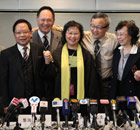Op-Ed Contributors
Ukraine and the fading color of Orange Revolution
By He Wei (China Daily)
Updated: 2010-02-04 07:49
 |
Large Medium Small |
Ukraine held the first round of its fifth presidential election on Jan 17, in which Viktor Yanukovych, former prime minister and head of the Party of Regions, secured 35.32 percent of the votes. Yulia Tymoshenko, incumbent prime minister and leader of the All-Ukrainian Union "Fatherland", followed him with a quarter of the votes. In third place was Serhiy Tihipko, an independent candidate, who got 13.05 percent of the ballots.
Making up the rear was President Viktor Yushchenko, who managed to get only 5.45 percent of the votes. Since none of them could win an absolute majority, the top two candidates, Yanukovych and Tymoshenko, will take part in a runoff on Feb 7.
| ||||
Ukraine's politics has gone through many ups and downs since the Orange Revolution, with political parties trying to divide state power among the president, parliament and the administration. As a result, Ukrainians have seen two parliamentary elections and five cabinets in less than five years. And the country has suffered because of the resultant governmental and parliamentary crises and rampant corruption.
To make matters worse the global financial crisis dealt one of the heaviest blows to the country's economy, forcing it to shrink by a staggering 14 percent last year.
Many Ukrainians doubt Yushchenko's ability to rule the country any more and hold him responsible for the chaos. And the first round of the election shows they believe the political and economic crises can be resolved only if a new president is elected and policies are changed.
There is now a new configuration of political forces in Ukraine. During the Orange Revolution, the country was divided into two distinct camps, the "Orange" and the "Blue". Shortly after the 2004 election, however, Yushchenko and Tymoshenko, the two protagonists of the Orange camp, split and thus changed the political formation into a triangle.
This election has seen the participation of all the bigwigs of Ukrainian politics, from the left to the right. So it's not surprising to know that they hold almost all the political resources of the country.
But voters don't seem decided on whom to choose as the result of the first round of the election shows. Yanukovych and Tymoshenko have edged out the other two big candidates, though.
If on one hand, the election signals the political fall of Yushchenko, on the other it shows the rise of Tihipko. This could be the beginning of a new political formation, especially because the political parties are likely to regroup in order to get a slice of the new government's pie.
After the Orange Revolution, Ukraine's relations with Russia deteriorated. Last year's energy dispute between the neighbors, however, made Ukraine realize that it had to handle its relations with Russia properly even if it wanted to join the European Union. Ukraine can choose which grouping it will be part of but it cannot decide which countries are going to be its neighbors.
Ukraine cannot sever historical ties and long-term economic interdependence that link it with Russia. It cannot afford to sour relations with Russia because it depends heavily on its neighbor for fuel, and the weakening of its economy because of last year's dispute over natural gas should make it realize that.
The top four candidates in the presidential race have advocated balanced diplomacy and reconciliation with Russia, which implies that voters want Ukraine to mend its fences with Russia.
Whether Ukraine will work toward it depends on whoever is elected president. Yanukovych and Tymoshenko seem to be on a par with each other. As incumbent prime minister, Tymoshenko controls abundant administrative resources. And as a former prime minister, Yanukovych is an excellent politician. Both have their advantages, making the Feb 7 runoff a close affair.
Yanukovych has been elected prime minister twice and performed well during both his terms. Though he lost the 2004 presidential election to Yushchenko by 2 percent, his Party of Regions won the majority of the seats in the 2006 and 2007 parliamentary elections.
Since last year, he has been at the top of the approval ratings. And some Ukrainian scholars believe Yanukovych represents the interests of a large section of constituents, which cannot be ignored by any government making his position fairly stable.
The personal charisma of Tymoshenko, the "beautiful prime minister", should not be underestimated, though. She is the "natural gas princess" and deemed omnipotent in Ukraine's energy market. Despite all the ebbs and tides in Ukraine's political arena after the Orange Revolution, Tymoshenko has displayed her resolute character as well as elastic and mellow political skills. The way she handled the A(H1N1) flu issue made Ukrainians appreciate her extraordinary adaptability.
But the final outcome will depend on not only the personal charisma of Yanukovych or Tymoshenko, but also the stances Tihipko and Yushchenko take - that is, which candidate they support. The world's attention is focused on Ukraine because it is holding its first presidential election since the Orange Revolution. And no matter who wins, we can be pretty sure that the new president will make economic recovery the government's primary task.
But despite Ukraine's great geopolitical importance, its influence over the international community is limited. Therefore, Russia and the Western powers will not change their East European policy greatly for the Ukrainian election. So the outcome of the election is unlikely to have a great impact on the situation in Europe or Russia's energy supply to the West.
The author is a researcher on Ukraine studies with the China Academy of Social Sciences.
(China Daily 02/04/2010 page9)












